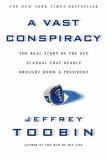Summary | Excerpt | Reviews | Readalikes | Genres & Themes | Author Bio

The Real Story of the Sex Scandal That Nearly Brought Down a President
by Jeffrey ToobinFrom Chapter 17
"I Don't Care If I'm Impeached . . ."
For all the condemnation of Clinton's speech in the news media, the prosecution team didn't take any false optimism out of the events of August 17. In his grand jury testimony, the president had been more careful than in his deposition, seven months earlier.
Increasingly, the savvier members of the prosecution staff recognized that their entire case came down to the sex - whether the president had lied about it in his deposition and then in his grand jury testimony. In light of Clinton's refusal to answer certain questions, Bittman and Wisenberg had pinned him down as best they could. Before the grand jury, Clinton had repeated his position that as he understood the definition of sexual relations provided to him on January 18, he had not had such contacts with Lewinsky. Clinton had admitted to "inappropriate intimate contact," which he declined to spell out, but by a sort of process of elimination, he had said he had not "directly" touched Lewinsky's breasts or vagina with his hands or mouth "with intent to arouse" her.
It was a slender basis on which to make a case. Since Clinton had admitted intimate contact, what difference did it make whether he acknowledged precisely how and where he had placed his hands and mouth? A big difference, according to the clear consensus at the Office of Independent Counsel. If they could prove a falsehood-any falsehood-they were going to make a case, regardless of the subject matter. In a United States Attorney's Office, where judges and prosecutors were lied to with regularity, prosecutors would weigh the significance of the false statements and consider whether the government's resources might be better deployed in another way. But in an independent counsel's office, especially this one, this kind of thinking was anathema. As Starr said in one of his curbside news conferences, "Okay, you're taking an oath . . . under God, that you will - 'so help me, God, that I will tell the truth.' That's awfully important. Now that means we attach a special importance to it. There's no room for white lies. There's no room for shading. There's only room for truth. . . . You cannot defile the temple of justice."
So Starr would pursue the perjury about sex, and that raised a different issue. In her testimony before the grand jury on August 6, Lewinsky had spoken in a general way about her sexual relationship with the president. Now, in light of how the Starr team wanted to parse Clinton's answers in the grand jury, there would be a need for a great deal more specificity about the mechanics of their encounters. How they chose to conduct that next examination of Lewinsky would itself turn out to be a landmark in the history of American law enforcement.
Women who met Starr for the first time often remarked on his courtliness - opening doors, pulling out chairs, and generally behaving as he was taught in San Antonio. He was a good listener, too, and his pet phrase "the deliberative process" almost became a joke around the OIC because things sometimes moved so slowly. But no matter how long it took, Starr believed in hearing everyone out. At the end of the process, though, one thing remained the same in any organization Starr had led: he followed the advice of men.
During the three decades of Starr's career, the legal profession integrated many women into positions of responsibility. This was especially true in criminal law. But in the Justice Department, at Kirkland & Ellis, and in the Office of Independent Counsel, Starr invariably chose deputies who looked and sounded like him. As someone who had benefited enormously from powerful mentors like Warren Burger and William French Smith, Starr, too, had a series of protégés in the law-all young white men. Starr's refusal to delegate power to women was especially striking at the OIC. All of his deputies were men. Twenty-nine prosecutors represented the OIC in the grand jury-twenty-five men and four women. There were 121 sessions with witnesses before the grand jury-and women prosecutors led the questioning six times. There were small slights, too. After the convictions in the Whitewater trial, Starr called all the members of the prosecution team to congratulate them except for the one woman, Amy St. Eve.
Copyright Jeffrey Toobin 1999. Published with the permission of the publisher - Random House.




Books are the carriers of civilization
Click Here to find out who said this, as well as discovering other famous literary quotes!
Your guide toexceptional books
BookBrowse seeks out and recommends the best in contemporary fiction and nonfiction—books that not only engage and entertain but also deepen our understanding of ourselves and the world around us.